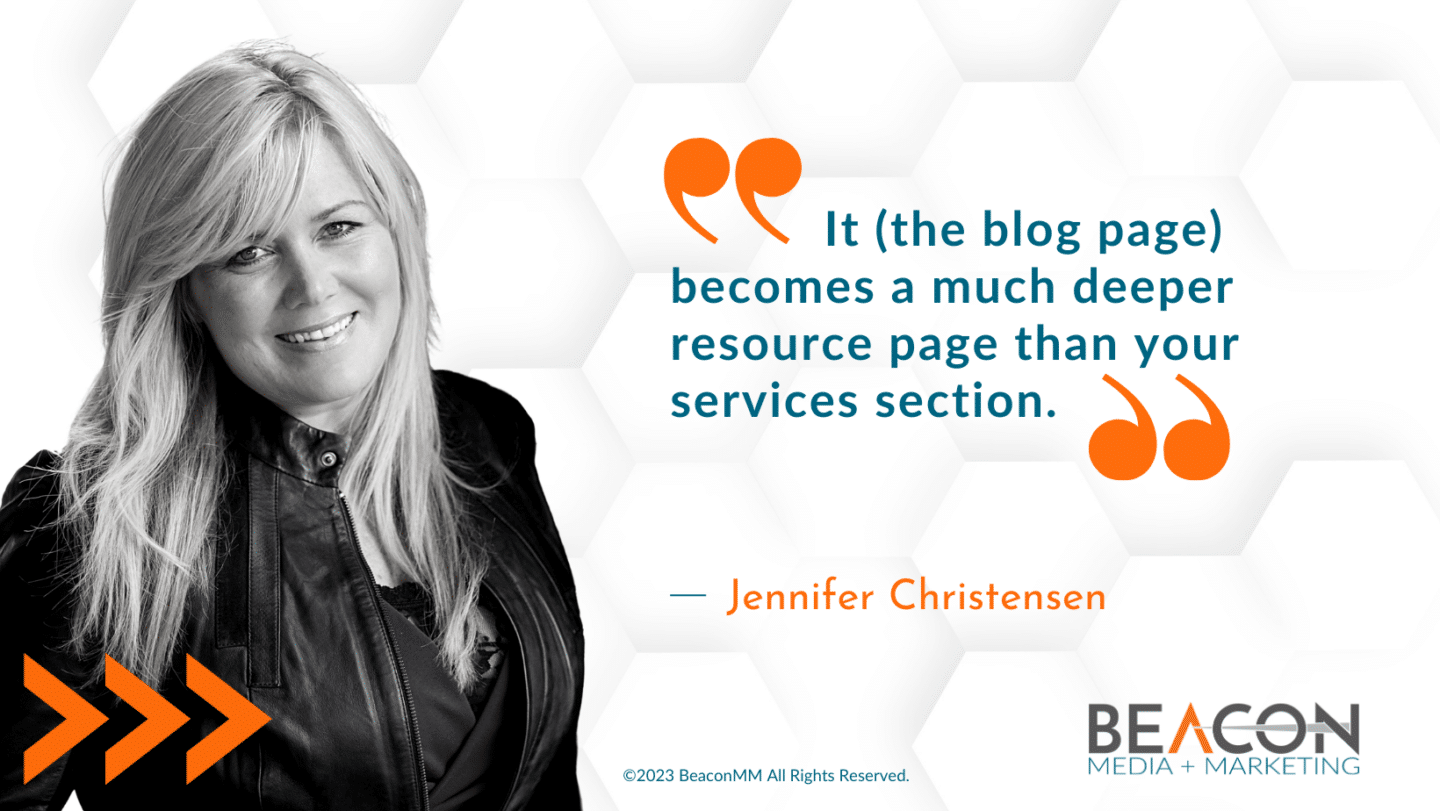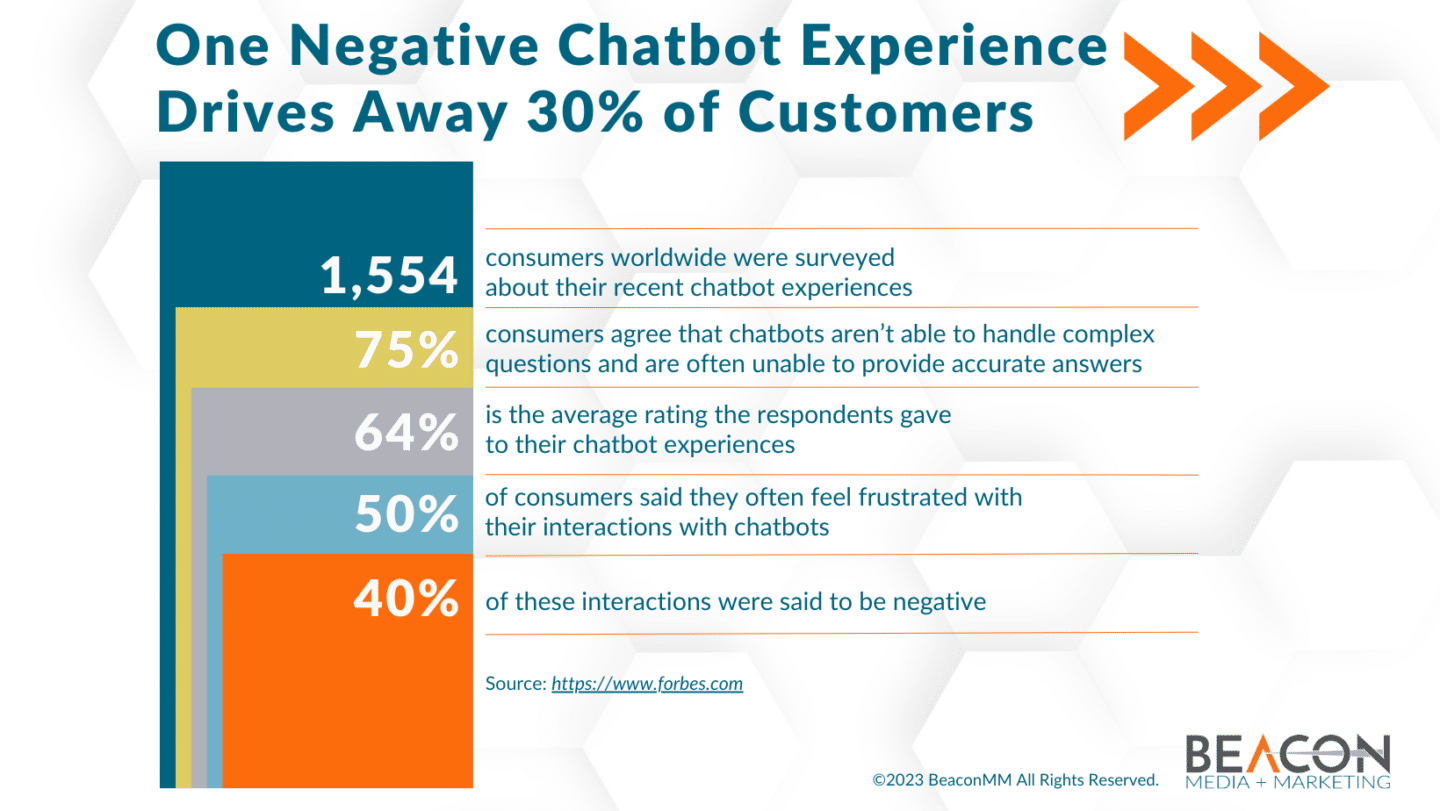Authors Adrienne Wilkerson and Jennifer Christensen, adapted to blog by Sara Jokela
In this series, we have been discussing best practices for websites, and what website pages you should include. This installment will discuss the blog page, the FAQ page, and the contact page.
For more information on website best practices, see The Beacon Way Episode 12, Episode 13, and Episode 14.
To Blog or Not To Blog: Is It an Effective Use of Your Time?

Blogs have evolved significantly over the years and they absolutely can be effective and important to your website.
Providing dense, relevant content to your website pages along with search engine optimization helps your website rank higher with Google which is why blogs can now be seen featuring 2,000 words instead of the previous 1,000-1,200 words.
Clients and your target audience want to learn about your company and the services you offer prior to engaging you in further conversation. This is also where page titles can be a huge asset in initial engagement — as creating a blog page is a valuable tool to providing in-depth information on your website.
Blog subjects can range from how-to guides, pricing strategies, your origin story, and even a highlight of your vendors. Above all, the blog page should be a resource center for those you’re trying to reach.
At Beacon Media + Marketing, we prioritize the categorization and organization of our blog page based on the subject. We want to remove any barrier to a client or potential client finding the information they are looking for.
As mentioned above, this is also advantageous for SEO! Google loves blogs, and Google loves to favorably rank blogs that specifically address the search terms your client and potential client are using.
By providing information on a blog page, you are answering what we call “top of funnel” questions. These are questions that are at the beginning of the research phase of the buyer’s journey and lend to the credibility of your business.
For more information about the Buyer’s Journey, visit The Beacon Way Episode 6: The Customer Buying Process, and Episode 7: How Does The Beacon Way Help The Customer Through The Buying Process.
Should Your Service Pages Cover Sales Questions?
No, not in our opinion and experience. Utilizing web pages such as a blog page that is set up for providing information will be a more authentic user experience that develops the trust of potential customers.
Having a lot of articles available that are answering the questions of your target audience is a great pathway to moving them further down your sales funnel. Some potential customers will take a while to contact you — but if even a fraction of those who visit your blog book an appointment, that is still something we consider a win.
Why Make the Time Investment in Blogs?
Blogs not only provide answers to potential customers and clients, but they offer the flexibility to be adapted into social media assets as well. Blog posts are a great marketing tool to pull quotes for posting and linking back to your small business website.
Blogs also offer a low-pressure approach to your sales process that introduces people to your company and your services without the pushy hard sell of “BUY NOW”.
Just the FAQs For an Effective FAQ Page
Our best advice is to not allow the FAQ page to be an excuse for not answering client questions. Nothing can be more frustrating to website visitors who would like to use a chatbot, make a phone call, or send an email to get more information, only to be sent back repeatedly to the FAQ page.
Just like a testimonials page, FAQ pages can be very effective if used correctly. However, they can also create the impression of your business that it is cold, unapproachable, and seem as if you have no desire to answer more complex or nuanced questions.
Tips and Tricks to Effectively Build Your FAQ Page
- Prioritize user-friendliness:
Users won’t stay in your FAQ section or on your website if they have to hunt for the answer they’re looking for. - Optimize visual appeal and accessibility:
The font and styling of the FAQ should draw the eye and be easy to read. - Utilize video links:
Many services can be complex, or they may be new, and a video to explain your product or service process may be the best way to answer potential questions your clients may have. - Organize FAQs by category:
Questions about billing should be separate from questions about shipping. It just makes sense! - Reinforce your brand by leveraging your FAQ page:
Your website pages need to feel consistent so that no matter which of the sections the visitor encounters, it feels authentic to your brand messaging. - Use the FAQs as a starting point for further engagement:
CTAs, chat forms, videos, and blogs are all good options to redirect to or help enhance the information that is being addressed in the FAQ. - Level up by including a personal touch:
Some answers may be just too complex or nuanced to answer in a FAQ so add a personal touch by owning that and providing an avenue for contact that will allow that question to be answered properly and thoroughly. - Understand and strategize FAQs as a customer service tool:
Here at Beacon, we are all for using technology to enhance your client and potential customer experience. We advise that when using a FAQ list, do your best to ensure that it is a benefit and not a deterrent.
Contact Us! How to Leverage the Contact Page as an Effective Marketing Tool
We’ve seen it time and time again, the contact page looks empty and neglected. Your contact page is one of your most important pages and should contain more than just your phone number. In fact, there is a huge opportunity to leverage this page to help meet your marketing goals.
What Should You Consider When Writing Your Contact Page?
Contact pages will have less content than other pages on your website, but they also offer a tremendous opportunity to add relevant information — and incorporate search engine optimization (SEO).
When you are strategizing your contact page, some things to consider adding are the various ways to contact you, the most effective way to contact you, and whether you are going to send them to a form.
Many businesses have several forms of communication but some are more easily accessible than others. For instance, if you are sending them to a contact us form and your typical turnaround is 24-48 hours, that should be specified at the time they are sent to the form. Communicating return contact expectations build trust.
Site visitors often may want a quicker way to contact you without a wait time, so there should be several options available and detailed information on how that contact will be handled.
Extending the Investment in Building Trust Past Your Service Page and into the Contact Us Page
All of these considerations should focus on keeping the trust that you have built up until this point. Your contact details are just as important to search engines as your home landing page, blog, services page, and product page.
Each of those pages was strategically built to bring in leads but if those leads aren’t converting because the contact experience isn’t meeting expectations, you’ve lost trust.
The Contact Us Page: A Most Important Portfolio Page
Moving beyond research into conversion is all in the details for many reasons across your site. Visitors want to options so we recommend that you give as many options for contacting you as possible and explain how those options can be used best.
The contact us page is a critical web page — and a continuation of the customer experience. Customer feedback can be vital when reviewing and setting up your page.
Many customers use the contact us page to get a hold of you when something goes wrong and you certainly don’t want to leave them hanging when they need you.
Maintaining the client relationship is just as vital as gaining a new client relationship. Happy clients tend to send referrals and they won’t send a referral if they have difficulty contacting you.
Chatbots: Potential Annoyance or Asset?

Chatbots can be both a potential annoyance and an asset. We’ve all had the experience of a chatbot that isn’t working properly and that is incredibly frustrating.
In the era we are living in, AI chatbots pop up automatically on most sites your visit. When the chatbot is aggressive and it’s not easy to navigate away from it, that can be highly annoying for the user.
Ultimately, it is another option for a form of communication and people like options. We have seen that the more we call out the chatbot for what it is, the better customer responds to it and we like to communicate the expectation of when to expect the return reach out.
Best Practices for Chatbots
- Make sure to communicate clearly whether or not a human is attached to the chatbot:
Customers who expect to be connected to a customer service agent but are funneled to a form instead are likely to lose trust in your business. - Clearly communicate all the details of the return reach out:
Removing barriers to contact are important when strategizing how your customers can contact you. Clearly communicating when you are and are not available builds trust in your business. - Allow the user to be able to close the chatbot and return to it if they want to:
Chatbots that obstruct the user, particularly on mobile, from navigating your site to retrieve the information they are looking for will be more likely to bounce off your site.
Transparency Matters in the Digital Customer-Facing Landscape
No matter your industry, being transparent in your customer-facing digital landscape is crucial to building the trust with clients that we so often talk about.
The answer could be that you won’t be able to answer them for a week because you are out of the office, and that is ok as long as you clearly communicate that upfront to the customer.
Don’t shy away from being honest and transparent with your digital marketing efforts. It will really serve you well in the long run.
The Beacon Way is a Podcast and blog series with the mission to help others understand and navigate the digital marketing world. Listen to The Beacon Wayon our website or wherever podcasts can be found.